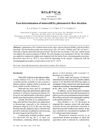 19 citations,
January 2018 in “Scientific Reports”
19 citations,
January 2018 in “Scientific Reports” Non-immune factors play a significant role in alopecia areata.
 17 citations,
December 2015 in “International Journal of Cosmetic Science”
17 citations,
December 2015 in “International Journal of Cosmetic Science” Visible light can improve skin disorders and hair loss, but more research is needed to understand long-term effects.
 17 citations,
December 2010 in “Journal of Investigative Dermatology”
17 citations,
December 2010 in “Journal of Investigative Dermatology” Flightless I protein affects hair growth, with low levels delaying it and high levels increasing hair length in rodents.
 17 citations,
December 2001 in “Journal of Investigative Dermatology”
17 citations,
December 2001 in “Journal of Investigative Dermatology” The osteopontin gene is active in a specific part of rat hair follicles during a certain hair growth phase and might affect hair cycle and diseases.
 16 citations,
October 2019 in “Biological & Pharmaceutical Bulletin”
16 citations,
October 2019 in “Biological & Pharmaceutical Bulletin” Houttuynia cordata extract may help hair grow by improving cell survival and increasing cell growth.
 16 citations,
January 2016 in “Annals of Dermatology”
16 citations,
January 2016 in “Annals of Dermatology” Green tea component EGCG may help prevent hair loss by changing microRNA levels in certain scalp cells.
 16 citations,
March 2015 in “Clinical Cancer Research”
16 citations,
March 2015 in “Clinical Cancer Research” The document concludes that side effects from Smoothened inhibitor drugs for skin cancer are reversible and can be managed with a team approach to maintain quality of life.
 16 citations,
July 2013 in “Human & Experimental Toxicology”
16 citations,
July 2013 in “Human & Experimental Toxicology” Almost half of the dermatology patients in Eastern Turkey use alternative medicine, which can be risky and delay proper treatment.
 16 citations,
July 2012 in “Current pharmaceutical biotechnology”
16 citations,
July 2012 in “Current pharmaceutical biotechnology” New treatments for skin conditions related to the sebaceous gland are being developed based on current research.
 15 citations,
September 2018 in “Medicine”
15 citations,
September 2018 in “Medicine” Childhood ptosis can vary from a minor cosmetic issue to a serious condition and may signal other health problems.
 15 citations,
August 2013 in “Stem Cells and Development”
15 citations,
August 2013 in “Stem Cells and Development” The method increases stem-like cells for better skin regeneration.
 15 citations,
July 2013 in “Cell Reports”
15 citations,
July 2013 in “Cell Reports” Indian Hedgehog helps control skin cell growth and protects against aggressive skin cancer.
 15 citations,
June 1995 in “The American Journal of the Medical Sciences”
15 citations,
June 1995 in “The American Journal of the Medical Sciences” Finasteride caused enlarged breast tissue in a 62-year-old man.
 14 citations,
June 2021 in “Expert Opinion on Therapeutic Patents”
14 citations,
June 2021 in “Expert Opinion on Therapeutic Patents” New patents show progress in developing drugs targeting the Wnt pathway for diseases like cancer and hair loss.
 14 citations,
April 2019 in “Genes”
14 citations,
April 2019 in “Genes” Researchers found a genetic region that influences the number of coat layers in dogs.
 14 citations,
March 2019 in “Journal of Cosmetic Dermatology”
14 citations,
March 2019 in “Journal of Cosmetic Dermatology” Activated platelet-rich plasma helps hair growth by boosting growth factors and cell growth pathways in hair cells.
 14 citations,
October 2018 in “Brain Research Bulletin”
14 citations,
October 2018 in “Brain Research Bulletin” Exosomes help nerve fibers grow by affecting specific cell signaling pathways.
 14 citations,
December 2013 in “Molecules”
14 citations,
December 2013 in “Molecules” Two compounds from Asiasarum heterotropoides roots show potential as lung cancer treatments without harming normal cells.
 13 citations,
April 2022 in “Frontiers in oncology”
13 citations,
April 2022 in “Frontiers in oncology” Melanoma development can be linked to the breakdown of skin's melanin-producing units.
 13 citations,
January 2021 in “RSC chemical biology”
13 citations,
January 2021 in “RSC chemical biology” Wnt activation shows promise for regenerative medicine but requires selective targeting to minimize risks like cancer.
 13 citations,
January 2020 in “Neuroscience”
13 citations,
January 2020 in “Neuroscience” Blocking 5α-reductase can harm memory and brain structure, and increase harmful brain changes in male mice used for Alzheimer's disease research.
 13 citations,
January 2020 in “Scientific Reports”
13 citations,
January 2020 in “Scientific Reports” The African spiny mouse heals skin without scarring due to different protein activity compared to the common house mouse, which heals with scarring.
 13 citations,
September 2019 in “EBioMedicine”
13 citations,
September 2019 in “EBioMedicine” sPLA2-IIA increases growth in hair follicle stem cells and cancer cells, suggesting it could be targeted for hair growth and cancer treatment.
 13 citations,
January 2018 in “Cellular Physiology and Biochemistry”
13 citations,
January 2018 in “Cellular Physiology and Biochemistry” Fat-derived stem cells can help protect and repair skin stem cells from aging caused by UV light.
 13 citations,
January 2017 in “Molecules”
13 citations,
January 2017 in “Molecules” Compounds from Alpinia zerumbet may help with hair regrowth and cancer treatment by targeting PAK1.
 13 citations,
December 2012 in “Cells”
13 citations,
December 2012 in “Cells” Targeting the actin cytoskeleton could improve skin healing and reduce scarring.
 13 citations,
September 2005 in “Eclética Química”
13 citations,
September 2005 in “Eclética Química” Quick, accurate minoxidil measurement in hair loss products using photometric flow titration.
 13 citations,
August 1995 in “The Journal of Steroid Biochemistry and Molecular Biology”
13 citations,
August 1995 in “The Journal of Steroid Biochemistry and Molecular Biology” The activity of a specific rat enzyme in the prostate and epididymis is highly dependent on the acidity level.
 12 citations,
November 2020 in “Journal of Dermatological Science”
12 citations,
November 2020 in “Journal of Dermatological Science” Found microRNA differences in hair cells, suggesting potential treatment targets for hair loss.
 12 citations,
March 2019 in “Lasers in Surgery and Medicine”
12 citations,
March 2019 in “Lasers in Surgery and Medicine” Low-level laser therapy improves hair growth and dermal papilla cell function.






























